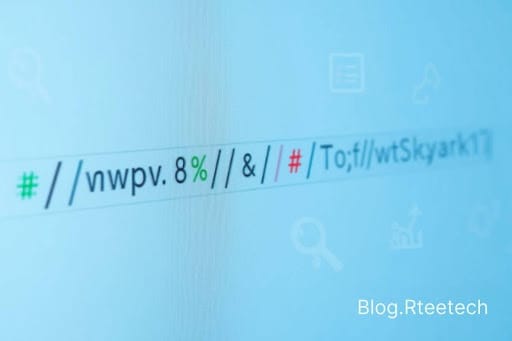What Characters to Use Not Use SEO: A Complete Guide - Rteetech

When it comes to search engine optimization (SEO), even the smallest details can make a big impact. One such detail is knowing what characters to use not use SEO.
Your choice of characters in URLs, filenames, meta descriptions and other elements can affect how your content ranks on search engines and how users engage with it.
In this article, you'll learn what characters to use and avoid in SEO, why they matter and how to optimize your content structure for better rankings and user experience.
Understanding Characters in SEO
SEO characters refer to the number of letters, spaces and symbols used in titles, meta descriptions and URLs for better optimization.
What Are Characters in SEO?
Characters are the letters, numbers, symbols and punctuation marks used in your website's URLs, HTML tags, headings, metadata and more.
These characters can influence how search engines like Google index your content and how users perceive it. Certain characters help improve readability, user experience and indexability.
Others like special characters and unnecessary symbols can cause confusion, errors or even prevent pages from being crawled correctly by web crawlers.
Why Do Characters Matter in Search Engine Optimization?
Search engines rely on clean, understandable structures to index content accurately. Misusing characters can create broken links, duplicate content or worse confuse users and search algorithms.
Knowing which SEO should be avoided in terms of character usage helps ensure your content is easy to read, keyword relevant and SEO friendly.
The Importance of Using the Right Characters
Choosing the right characters impacts:
- Search engine readability: Helps web crawlers understand and index pages correctly.
- User experience: Clean URLs and filenames improve trust and readability.
- Click-through rate (CTR): Clear meta descriptions and page titles with the right characters draw more attention.
- Avoiding keyword stuffing: Proper formatting and character use help maintain a natural flow.
- Mobile optimization & accessibility: Clean, well structured content is easier to view across devices.
What Is Not Good for SEO?
Characters that confuse search engines or disrupt user readability such as excessive symbols, encoded characters or inconsistent punctuation are bad for SEO. They affect both rankings and user trust.
Characters to Use in SEO
Use lowercase alphanumerics and hyphens in URLs for clarity and SEO friendliness, avoid underscores and uppercase to prevent issues.
Alphanumeric Characters (a-z, A-Z, 0-9)
These are the safest and most recommended. They are universally understood by search engines and browsers.
Hyphens (-)
Used to separate words in URLs and filenames. They improve readability and are favored by search engines. Example: seo-best-practices.
Underscores (_) – Use Only in Filenames
While Google can now recognize underscores, they are still not as SEO friendly as hyphens in URLs. Use them only in filenames if needed.
Lowercase Letters
URLs are case sensitive. Mixing uppercase and lowercase letters can result in duplicate content issues. Stick to lowercase only.
Inspired by this post? Discover more deep dives into AI, startups and digital innovation at Reteetech Blog, your hub for futureforward thinking.
Characters to Avoid in SEO
Avoid spaces, special symbols, emojis and non ASCII characters in URLs, they hurt readability, break links and confuse search engines
Spaces
Spaces in URLs are converted to %20, making them look cluttered. They also reduce readability and can hurt CTR.
Special Characters (&, ?, %, #, , /, <, >, {, }, [, ], |)
These symbols often have reserved meanings in HTML or URL structures. Using them can break links or confuse search engines.
Multiple Periods (..)
Periods are used for file extensions. Avoid using multiple periods, as it can confuse both users and algorithms.
Reserved Characters
Avoid using characters like {}, [], or | in URLs or file names. They can be misinterpreted by browsers or cause security flags.
Emojis or Non ASCII Characters
While fun, emojis or special language characters might not render properly across all devices or browsers, negatively affecting accessibility and consistency.
Actionable Strategies: How to Use SEO Friendly Characters
Use hyphens, keep URLs clean and keyword rich, avoid symbols and check encoding to boost SEO performance and search clarity.
Use Hyphens Instead of Spaces or Underscores
Hyphens separate words clearly and are preferred in URLs and metadata. Example: best-seo-practices is better than best_seo_practices or best seo practices.
Keep URLs Short and Descriptive
Avoid adding unnecessary characters. Clean URLs improve both rankings and click through rate. Example: site.com/seo-guide is better than site.com/seo&guide=101.
Place Focus Keywords Early
Put important keywords at the beginning of your URLs, meta descriptions and titles. This helps search engines quickly understand your content’s focus.
Use Clean Filenames for PDFs and Images
When uploading files, use SEO friendly filenames like seo-tips-guide.pdf or onpage-seo.jpg. Avoid symbols, spaces or irrelevant text.
Stick to Semantic HTML
Semantic HTML improves content structure and accessibility. Use correct heading tags (H1-H6), alt text for images and avoid inline styles filled with special characters.
Use Canonical Tags to Avoid Duplicates
Improper character use can create duplicate URLs. Canonical tags tell search engines which version to prioritize.
Check for Encoding Issues
Use SEO tools and search console to detect encoding or crawl errors caused by incorrect characters.
The Golden Rule of SEO: Keep It Clean and Consistent
When asked, What is the golden rule of SEO?The answer is simple: Keep your content clean, consistent and user focused. That includes using characters that enhance readability, avoid confusion and work well across all systems.
This applies to everything from URLs to alt text, from anchor text to schema markup. Don’t try to game the system with hidden symbols or keyword stuffing. Instead, build structured content with relevant keywords and clean formatting.
Conclusion
Understanding what characters to use not use SEO is a small but powerful part of building an effective SEO strategy.
The characters you choose influence readability, indexability and ultimately your rankings on search engines. Stick to alphanumeric characters and hyphens.
Avoid special characters and clutter. Keep your structure clean and descriptive. Doing so not only helps with SEO but also improves your user experience, trustworthiness and click through rates.
By following these simple yet impactful guidelines, you’ll make your content easier for users and search engines to understand leading to more organic traffic, better engagement and higher rankings.
FAQs
What characters to use and avoid in SEO?
Use alphanumeric characters, hyphens and lowercase letters. Avoid special characters like &, %, # and multiple dots in URLs or filenames.
Which SEO should be avoided?
Avoid black hat SEO techniques like keyword stuffing, cloaking or using deceptive URLs with hidden characters. They can result in penalties.
What is not good for SEO?
Poor content structure, unreadable URLs, special characters and duplicated or thin content are not good for SEO. Also, avoid slow site speed and broken links.
What is the golden rule of SEO?
Keep everything clean, user friendly and relevant. Use simple language, logical structure and avoid anything that confuses search engines or users.
Can I use special characters in meta descriptions?
You can, but use them sparingly. Overuse of symbols can reduce readability and harm CTR. Stick to punctuation like commas, periods or colons.
Are underscores or hyphens better for SEO?
Hyphens are better for URLs. Google treats hyphens as word separators, improving readability. Underscores can still work for filenames but not ideal for URLs.

